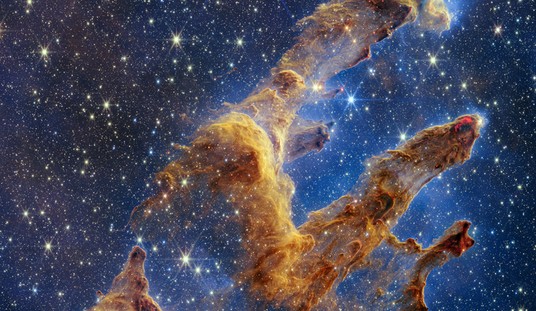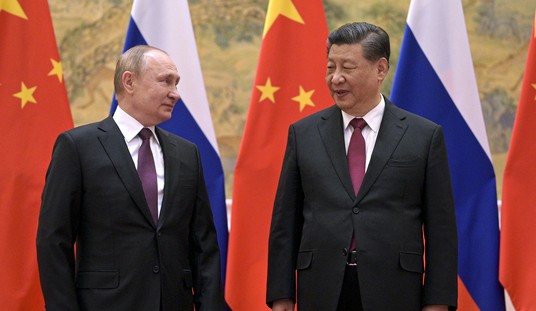All who love the Free World heard with sadness today’s news of the abdication of Pope Benedict XVI, whose physical infirmity caused him to step down from the chair of St. Peter. As the shepherd of the founding institution of the West, Benedict personally embodied its best traditions. He is one of the last men living to have assimilated the fullness of European culture, a member of the “heroic generation” of Catholic theologians that included Henri de Lubac and Hans Urs von Balthasar.
We will remember many acts of intellectual courage from this pope. One in particular comes to mind today, namely his speech at the University of Regensburg on September 12, 2006. In the face of great controversy, Benedict cited the Byzantine emperor Manuel II Paleologue: “Show me just what Mohammed brought that was new, and there you will find things only evil and inhuman, such as his command to spread by the sword the faith he preached.” And he added:
The emperor, after having expressed himself so forcefully, goes on to explain in detail the reasons why spreading the faith through violence is something unreasonable. Violence is incompatible with the nature of God and the nature of the soul. “God,” he says, “is not pleased by blood—and not acting reasonably is contrary to God’s nature.” . . .The decisive statement in this argument against violent conversion is this: Not to act in accordance with reason is contrary to God’s nature. . . . The editor [of the Greek text from which Benedict is quoting], Theodore Khoury, observes: For the emperor, as a Byzantine shaped by Greek philosophy, this statement is self-evident. But for Muslim teaching, God is absolutely transcendent. His will is not bound up with any of our categories, even that of rationality. Here Khoury quotes a work of the noted French Islamist R. Arnaldez, who points out that Ibn Hazm went so far as to state that God is not bound even by his own word, and that nothing would oblige him to reveal the truth to us. Were it God’s will, we would even have to practice idolatry.
Benedict’s commitment to theological truth as he understood it at the expense of political correctness is unique among today’s religious leaders.
Jewish communities in particular have reason for sadness at Benedict’s abdication. He is a true friend of the Jewish people. As Israeli journalist Assaf Sagiv wrote in the Autumn 2009 issue of the quarterly journal Azure on the occasion of the pope’s May 2009 visit to Israel:
Benedict XVI—the former Joseph Ratzinger—is actually one of the best friends the Jewish people has ever had in Vatican City. On the eve of the pope’s visit, Aviad Kleinberg, a scholar of Christian history and a columnist for the Israeli daily Yediot Aharonot, attempted to remind his readers of this. Ratzinger, he explained, “was the confidant of Pope John Paul II, and his immense theological authority was a critical aspect of the previous pope’s moves…. John Paul and Ratzinger buried once and for all not only the accusation of the Jews’ murdering the messiah, but the entire theological theory that the Christians replaced the Jews and are now the Chosen People and that the New Testament annuls the Old Testament. The Old Testament is still valid, declared the two, and the Jewish people is still God’s chosen and beloved people.”
I wrote at the time on the website of the religious magazine First Things where I was then an editor:
Benedict’s unprecedented efforts to draw near to Judaism as a religion were summarized by the Bonn University theologian Karl-Heinz Menke, who argues that His Holiness is the first pope since St. Peter to read the whole of the Gospels as a Jewish work. From a theological standpoint, the Jewish people have had no better friend in the Vatican since the founding of Christianity.
In particular, the first volume of Benedict’s book Jesus of Nazareth drew extensively on the writing of Rabbi Jacob Neusner, who showed that Jesus’ statements in Matthew 12 were a radical Christological declaration. Although Orthodox Jews well may take issue with some Neusner’s formulations, as Rabbi Meir Soloveichik observed, the pope’s literary dialogue with the American rabbi evinced his commitment to uncovering the Hebrew sources of Christianity.
On a personal note: As a graduate student poring through Renaissance texts on music and mathematics, I encountered then Cardinal Ratzinger’s writings on music. Subsequently the first fruits of my research were published by the Vatican’s music journal Rivista Internazionale di Musica Sacra, and I sent a copy of the manuscript to the cardinal, then head of the Sacred Congregation of the Faith in Rome. To my surprise I received a cordial letter from Ratzinger with a couple of helpful suggestions; the great man had not only taken the time to acknowledge an unsolicited paper from a graduate student, but had read it as well. I had the privilege to see his kindness and generosity first hand.
Years later I opened a copy of Der Spiegel at the Narita Airport transit lounge and read a summary of then Cardinal Joseph Ratzinger’s just-published book Die Salz von der Erde, published in English as The Salt of the Earth. It contained this stunning assertion:
We might have to part with the notion of a popular Church. It is possible that we are on the verge of a new era in the history of the Church, under circumstances very different from those we have faced in the past, when Christianity will resemble the mustard seed [Matthew 13:31-32], that is, will continue only in the form of small and seemingly insignificant groups, which yet will oppose evil with all their strength and bring Good into this world.
The courage of this statement from a prince of the Church touched me. “I have a mustard seed and I’m not afraid to use it,” I summarized Ratzinger’s attitude towards the attrition of faith in the West just before his election in 2005. The West has lost a great spiritual leader. We will be hard put to find another like him.
*****
Images courtesy shutterstock / Natursports / Christian Jung
More from David P. Goldman at PJ Lifestyle:
Why J.R.R. Tolkien’s Enduring Popularity Is a Cause for Hope in Our Popular Culture
Why You Won’t Find the Meaning of Life
Related at PJ Media:












Join the conversation as a VIP Member